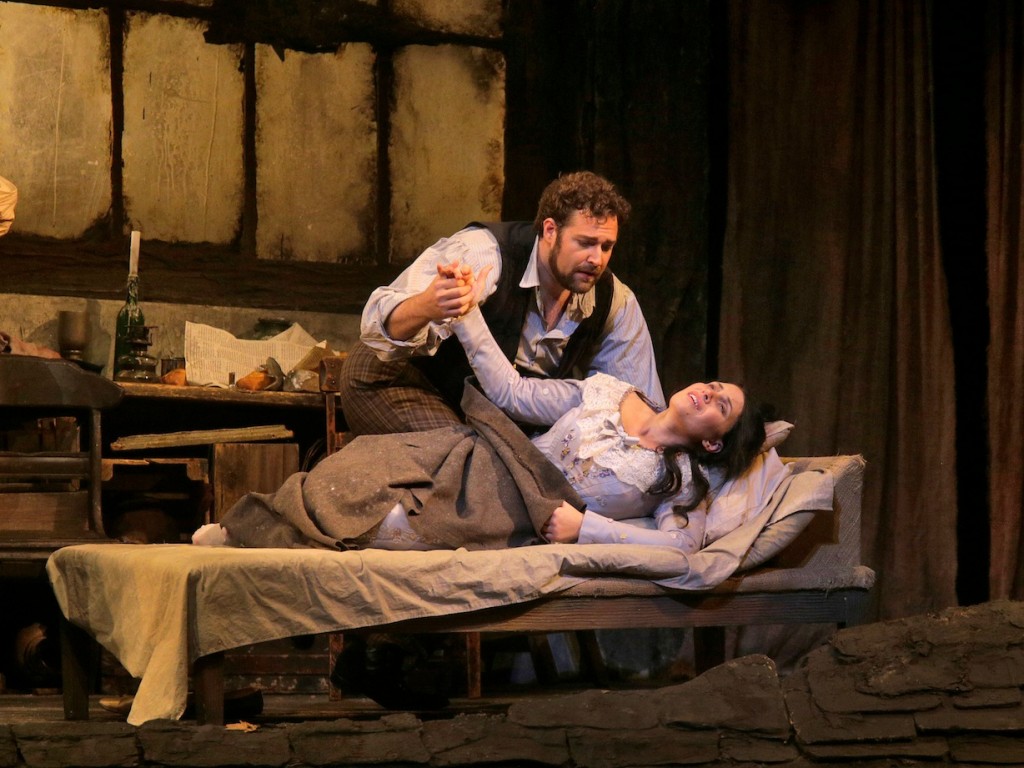Despite another sub, Met’s “Bohème” remains a strong and enjoyable show

Sonya Yoncheva (here with Bryan Hymel) in Puccini’s “La Boheme” at the Metropolitan Opera. Photo: Ken Howard
The Metropolitan Opera’s Monday casting change release reads like a send-up of the British nursery rhyme “This is the house that Jack built.” For the 1,266th company performance of La Bohème (in the umpteenth presentation of Franco Zeffirelli’s flashy 1981 production) Francesco Demuro would sing the role of Rodolfo in relief of the ailing Charles Castronovo, who was to replace the ailing Ramón Vargas. Meanwhile, Sonya Yoncheva was singing her third performance as Mimì, replacing Kristine Opolais, who was sent to Munich to replace Anna Netrebko in Manon Lescaut after an acute case of artistic differences. That the performers did not let their heads spin clean off was commendable.
Francesco Demuro’s performance was reasonable, given the circumstances. To make a debut on the world’s most renowned stage, in the touchstone role of Rodolfo, with less than twenty-four hours’ notice, is about as pressurized as high-pressure situations come. Demuro had sung the role earlier this year in Frankfurt, so it wasn’t a complete shot in the dark—but still, to walk on at the Met with no rehearsal is nobody’s idea of a good time.
Demuro managed, with a few exceptions, to produce clear top notes, but in his middle the tone was rough. The tenor’s phrasing tended towards blockiness, for instance in “Che gelida manina,” which he approached with little musical nuance. He also sounded small for the house, fighting in the early going to be heard over the orchestra, as well as when singing in unison with Yoncheva. Demuro’s scheduled debut, in next month’s La Traviata, will give him a fair shot at making a better impression.
Yoncheva earned praise at the opening of this run for her compelling artistry and rich voice, and she certainly did not disappoint in those departments on Monday, filling the hall with her presence and her blooming sound. Early on, there was a hardness to her tone, as she seemed to be pushing. She began “Sì, mi chiamano Mimì” at full voice, leaving little room to trace the aria’s glorious, soaring peaks. As the night went on her voice softened, and she was able to show true warmth and sweetness in the third act, her soft voice giving off a subtle glow.
As Musetta, Myrtò Papatanasiu had a similar arc—her singing in Act II’s “Quando m’en vo,” feeling wide at the top, and sliding and scooping into every turn. But, like Yoncheva, she calmed later on and was able to give beautiful, simple voice to her noble role in the final act.
Rodolfo’s three roommates were consistently strong. David Bizic as Marcello started off with a good-natured, character-baritone approach but showed a more robust sound that made him a convincing and sympathetic force in his argument with Rodolfo in Act III. Matthew Rose was a gruff and oaky Colline, and gave a simple, rough-edged, but heartfelt rendition of “Vecchia zimarra,” his touching farewell to his old overcoat. Alessio Arduini was an even-toned and charming Schaunard.
Perhaps it was the excitement of last-minute uncertainty, but the acting on Monday night felt more fresh than has been seen in this production recently. The relationships among the supporting characters—Musetta’s with Marcello, and the flatmates with each other—were beautiful to watch. In the final act, the goofy rooftop dueling scene made the intimate moments between Rodolfo and Mimì all the more arresting by contrast.
Riccardo Frizza ran hot and cold in the pit. The Met orchestra sounded sumptuous as ever, and most of the time he was able to put it to good use, reaching wonderful heights, and finely tapering every turn, but he often got carried away and overpowered his singers. There were a few ensemble fumbles, but those could be excused given the substitutions.
The circumstances being what they were, it was impressive enough that Monday’s Bohème did not seem to be hanging by a thread. Audiences can hopefully look forward to tighter performances when Ramòn Vargas returns to restore relative normalcy on December 1.
La Bohème runs through January 24 at the Metropolitan Opera. Charles Castronovo will sing Rodolfo on November 28, with Ramòn Vargas returning to the role for four performances beginning December 1. Angela Gheorgiu leads the cast as Mimì on December 10 and 13. Susanna Phillips sings Musetta for four performances beginning December 1. Kristine Opolais will return on January 15 to lead a new cast in three performances. metoperafamily.org






